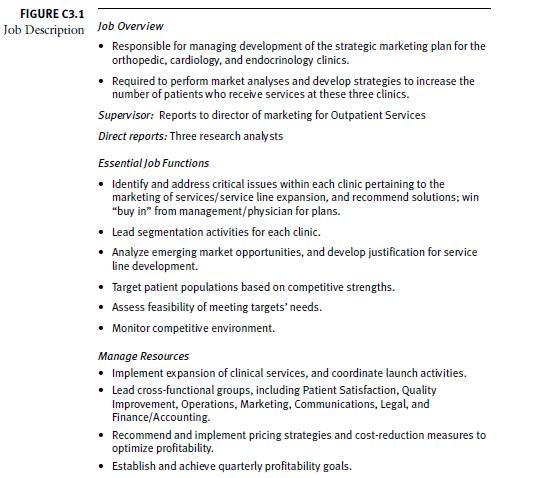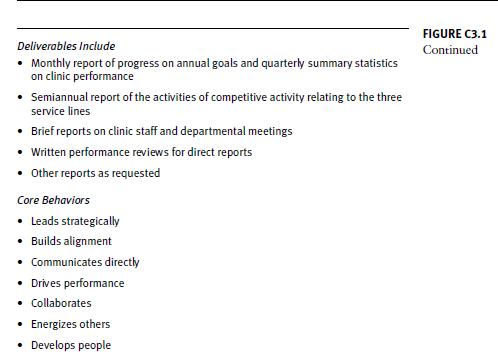Introduction Kristen Turtle closes the reminder on her calendar. She has 15 more minutes until a 90-day
Question:
Introduction
Kristen Turtle closes the reminder on her calendar. She has 15 more minutes until a 90-day performance review of Leslie Kopalski, her newest direct report.
Ms. Turtle has been director of marketing at Englewood Hospital for almost a year, and this is the first time she has supervised an employee who is not meeting expectations. She pushes the papers around her desk as she thinks about how to handle the meeting. She remembers her first hospital position ten years ago, right after she graduated.
Background
Ten years ago, Ms. Turtle just started her first job as a manager at Bayside Healthcare, the same system where only a year earlier she had completed her administrative fellowship under the chief operating officer. As a fellow, she formed great working relationships with many of the hospital’s administrators, including her new boss, Jessie Morris, director of public affairs. During her fellowship, Ms. Turtle worked on several projects for Ms. Morris and thought of her as a mentor. After several months under her, however, Ms. Turtle realized that Ms. Morris was not as easy to work for as she had expected.
During the hiring process, Ms. Turtle was told that she would contribute to several public relations projects for Bayside Healthcare’s outpatient clinics and that she would be directly responsible for two, large, revenue-generating projects in the emergency department each year. This type of work was what she had always wanted to do, and she was excited to get started on these projects right away. However, after her first month on the job, Ms. Turtle had not been informed of what the first project in the emergency department would be, nor had Ms. Morris posted the required formal work plan on the hospital’s online project-management system.
Several months later, Corey Powers, a former manager in Bayside Healthcare’s physician practice, was hired as Ms. Turtle’s counterpart. Mr. Powers’s job description was the same, with responsibility for two large, revenue-generating projects per year based in the outpatient clinics. He was excited to start his new position, but he was also experiencing a tense working relationship with Ms.
Morris. In his first week on the job, Ms. Morris sat down with her two new managers to discuss her expectations. She said she would be sending them work daily and expected the work to be completed quickly. She would closely monitor their performance until they were able to win her trust. She wanted them to type minutes for any meetings they attended without her. They both asked when they would get the details of their first major projects, the primary focus of their position, but Ms. Morris brushed them off, promising that she would inform them later.
Two weeks passed, and Ms. Turtle and Mr. Powers grew more frustrated with their jobs. Their work plans were still not entered in the project management system, and they were only working on small projects assigned daily by Ms. Morris. Moreover, their offices had not been completed, forcing both of them to move from desk to desk wherever space was available.
They finally decided to set up a meeting with Ms. Morris to discuss their frustrations. They developed an agenda for the meeting that included a discussion of the work they completed; proposals for their first projects; and a list of things they required to effectively perform their jobs, including a consistent work space. They framed the meeting as a time to develop a structured work plan, as they were unsure of their current role expectations. Unfortunately, the meeting did not go as smoothly as planned. Ms. Morris felt attacked and was defensive. Although they talked through their agenda items, they did not reach solutions on any issue. Everyone left the meeting feeling uneasy and suspicious.
The next day, Ms. Morris scolded Mr. Powers for the previous day’s events, saying that he and Ms. Turtle needed to learn their place. He walked away flabbergasted and found Ms. Turtle to tell her about the encounter. She was still on a six-month probation period, during which she could be fired with few questions asked. He, however, had served the system for four years and could not be terminated as easily. Nonetheless, he called his former boss and explained his situation. The boss offered him an open position, and he turned in his resignation, only one month after he began.
Ms. Turtle was now left alone and had few options except to do as she was told to survive her probationary period. Ms. Morris finally posted a work plan for her, but the plan and its expected results were vague. Ms. Morris continued to assign daily tasks, but they all had unrealistic deadlines. Although Ms. Turtle presented several proposals for her first project, Ms. Morris continued to dismiss her.
More weeks passed and Ms. Turtle learned from a close colleague that Ms. Morris had made a disparaging comment about her during a meeting attended by many service line managers. Apparently, Ms. Morris said, “Well, that was a mistake” in reference to having hired Ms. Turtle. Also, the col-league reported that the grapevine was abuzz with talk that Ms. Morris had been making derisive comments around the hospital about Ms. Turtle.
Ms. Turtle was furious about this news and was worried about its impact on her reputation. Not knowing what to do, she decided to leverage the relationships she had developed during her time as the fellow to save her reputation.
She set up meetings with several vice presidents and even her former boss, the COO, to discuss the situation. These meetings did not prove especially helpful, but she felt vindicated and avenged in some ways.
Ms. Turtle grew increasingly bitter about Ms. Morris’s unrealistic demands, especially the requirement to provide minutes for any meeting that she attended alone. Ms. Morris had access to Ms. Turtle’s calendar and carefully monitored it, sending her reminders about when she should send the minutes.
Ms. Turtle finally quit scheduling meetings on her electronic calendar, opting instead to stop by someone’s office if she needed to meet or to call for an appointment and jot down a reminder on her paper calendar. If her boss wanted to play games, then she could play too.
Two weeks before her six-month review, Ms. Turtle received a meeting request from Ms. Morris and Bruce Belding, vice president of outpatient services.
She expected that this meeting would not be good news, so she prepared a rebuttal the night before. As expected, Ms. Turtle was informed that her employment with the hospital was not working out and she could either be fired and given 30-days severance pay or resign, effective immediately. The reasons cited included (1) insubordination that negatively affected teamwork and customer service and (2) failure to provide quality and quantity of work expected.
Ms. Turtle resigned and left immediately.
Current Situation
Ms. Turtle was devastated by that experience, but she moved on. Right after her termination, she went to work for a competing hospital, where she stayed for several years. Although the sting of that first job has faded, she can still remember it and does not want her new direct report, Ms. Kopalski, to have the same experience. Ms. Turtle wishes now that she had given Ms. Kopalski consistent feedback throughout the past six months instead of waiting until now, her formal review date.
Ms. Kopalski is a recent graduate of a top-tier master of health administration (MHA) program. Six months ago, she accepted a position with Englewood Hospital, a private, secular, not-for-profit system that consists of a medical school, five hospitals, and a large ambulatory care facility. The system is consistently ranked among the top 25 hospitals in the United States, and it is world-renowned in oncology and cardiology. Before attending graduate school, Ms. Kopalski was a healthcare consultant in a small firm, where she was responsible for strategic planning projects with hospital clients. At that firm, she was a consistently good performer and worked her way up from analyst to contract manager. After earning her MHA, she wanted to apply the skill sets she had obtained in a different healthcare setting, so she applied for a position as a marketing manager for Englewood Hospital’s outpatient clinics.
In preparation for Ms. Kopalski’s performance evaluation, Ms. Turtle reviewed the job description she had given Ms. Kopalski when she joined the team (see Figure C3.1).


Ms. Kopalski’s Performance
On several occasions in the last six months, Ms. Turtle had been disappointed with Ms. Kopalski’s performance:
• The local newspaper reported that a local hospital was launching a new service line consisting of freestanding orthopedic clinics. However, Ms. Kopalski had not mentioned this new development, even though it could have a direct impact on the outpatient clinics for which Ms. Kopalski was responsible.
• One departmental director informed Ms. Turtle that the marketing department has had no representation at 9 out of the last 12 Patient Satisfaction and General Clinic Operations meetings.
• Ms. Kopalski submitted a preliminary draft of profitability goals, but Ms.
Turtle noticed several errors in the assumptions used to develop the goals. Additionally, the goals seemed shortsighted and arbitrary.......
Discussion Questions
1. Assume that the performance review is still a few days away. How should Ms. Turtle prepare for this meeting? Personally, how should she prepare to maximize the effectiveness of the review?
2. What additional information should Ms. Turtle have gathered before the meeting?
3. What could Ms. Turtle have done to prevent the current situation with Ms. Kopalski?
4. If you were Ms. Turtle, how will you give feedback to Ms. Kopalski? Outline an agenda for the performance review and think about how you will discuss each agenda topic.
5. What reaction do you anticipate Ms. Kopalski will have to Ms. Turtle’s concerns about her performance, and how should Ms. Turtle respond to this reaction? Every story always has multiple sides, and this scenario is no exception.
It is possible that Ms. Turtle’s perception of Ms. Kopalski’s performance only represents a portion of a bigger story. How do you expect Ms. Kopalski to talk about this situation?
6. How will Ms. Turtle determine if the performance review was successful? What outcomes should she expect?
Step by Step Answer:

Human Resources In Healthcare Managing For Success
ISBN: 9781567932997
3rd Edition
Authors: Bruce Fried, Myron D. Fottler





